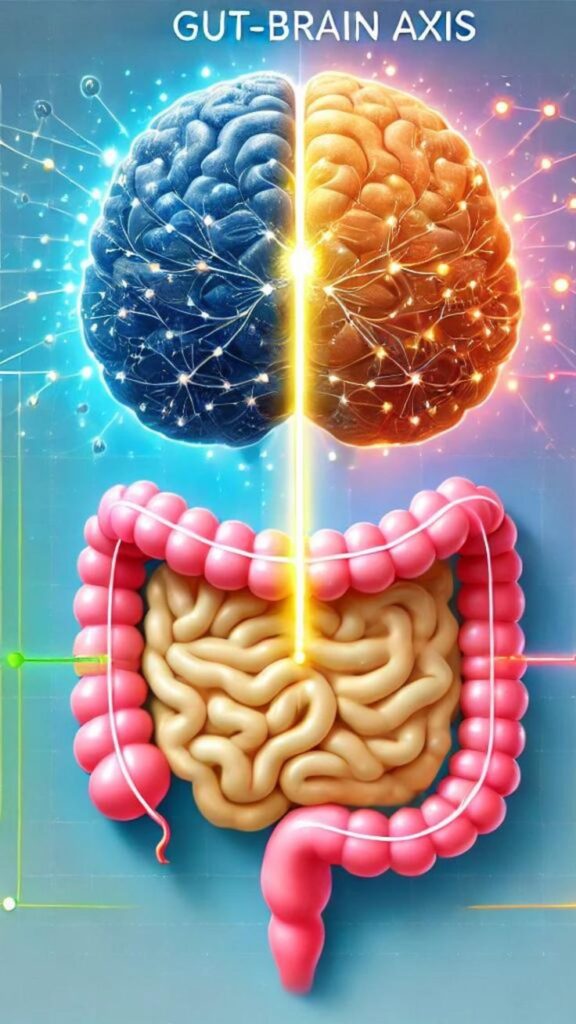The Gut-Brain Connection: How Your Second Brain Shapes Mood, Health & Well-Being

Your gut and brain are in constant communication, influencing everything from mood to digestion, immune function, and cognitive health. This intricate relationship, known as the gut-brain axis, is a two-way street where changes in one can significantly impact the other. Understanding this connection can empower you to make lifestyle choices that support both your mental and physical well-being.
How Your Gut Talks to Your Brain
Have you ever felt “butterflies” in your stomach before a big event? Or noticed how stress and anxiety can lead to nausea, bloating, or digestive discomfort? This is the gut-brain axis at work. Through the vagus nerve, hormones, neurotransmitters, and immune signaling, your digestive system and brain are in constant dialogue. A balanced gut can enhance mood and cognitive function, while an imbalanced gut can contribute to stress, anxiety, and even depression.
The Role of the Gut Microbiome
Your gut houses trillions of bacteria collectively known as the gut microbiome. These microorganisms don’t just aid digestion—they also produce neurotransmitters like serotonin and dopamine, which regulate mood, sleep, and cognitive function. A diverse microbiome fosters better emotional resilience, while an imbalance (dysbiosis) can increase the risk of mental health disorders and gastrointestinal issues like irritable bowel syndrome (IBS).
Neurotransmitters and Hormones: The Chemical Messengers
The gut produces several key neurotransmitters and hormones that influence your mental and physical health:
- Serotonin: 95% of this “feel-good” neurotransmitter is produced in the gut, influencing mood, sleep, and digestion.
- Dopamine: Responsible for motivation and pleasure, its production is linked to gut health.
- GABA: Helps reduce anxiety and promote relaxation.
- Cortisol: The stress hormone that, when imbalanced, can lead to inflammation and gut permeability (leaky gut).
Optimizing the Gut-Brain Connection for Better Health
1. Eat a Gut-Friendly Diet
A diverse diet rich in whole foods can enhance gut health and mental well-being. Focus on:
- Fiber-rich foods: Whole grains, legumes, fruits, and vegetables promote beneficial bacteria growth.
- Probiotic foods: Yogurt, kefir, kimchi, sauerkraut, and kombucha introduce good bacteria.
- Prebiotics: Garlic, onions, bananas, and asparagus feed beneficial gut bacteria.
- Healthy fats: Omega-3s from salmon, flaxseeds, and walnuts support brain and gut health.
- Fermented foods: Enhance gut bacteria diversity and digestion.
2. Manage Stress Levels
Chronic stress disrupts gut health, leading to inflammation and digestive issues. Reduce stress through:
- Deep breathing and meditation: Activates the vagus nerve, calming both mind and gut.
- Regular exercise: Boosts microbiome diversity and mental clarity.
- Adequate sleep: Supports neurotransmitter balance and gut repair.
- Mindfulness and hobbies: Activities like yoga, journaling, or listening to music stimulate relaxation and gut health.
3. Reduce Processed Foods and Alcohol
Highly processed foods, excessive sugar, and alcohol can disrupt gut microbiota, leading to inflammation and mood disorders. Prioritize whole foods and moderate alcohol intake to maintain a thriving gut environment.
4. Strengthen the Vagus Nerve
Since the vagus nerve plays a crucial role in gut-brain communication, strengthening it can enhance digestion and emotional resilience. Practices such as:
- Cold exposure (cold showers, ice baths)
- Singing, humming, and gargling
- Breathing exercises (slow, deep diaphragmatic breathing)
- Laughter and social connection
can all improve vagal tone and support a balanced gut-brain connection.
The Bottom Line: A Healthy Gut Equals a Healthy Mind
Your gut is more than just a digestive organ—it’s your “second brain.” By nurturing gut health through mindful eating, stress management, and lifestyle choices, you can positively influence your mood, cognition, and overall well-being.
Start making small, intentional changes today, and experience the transformative power of a thriving gut-brain connection!


